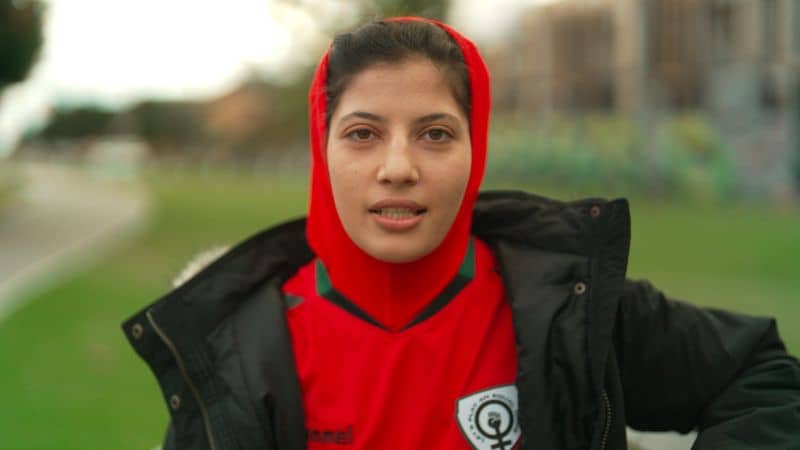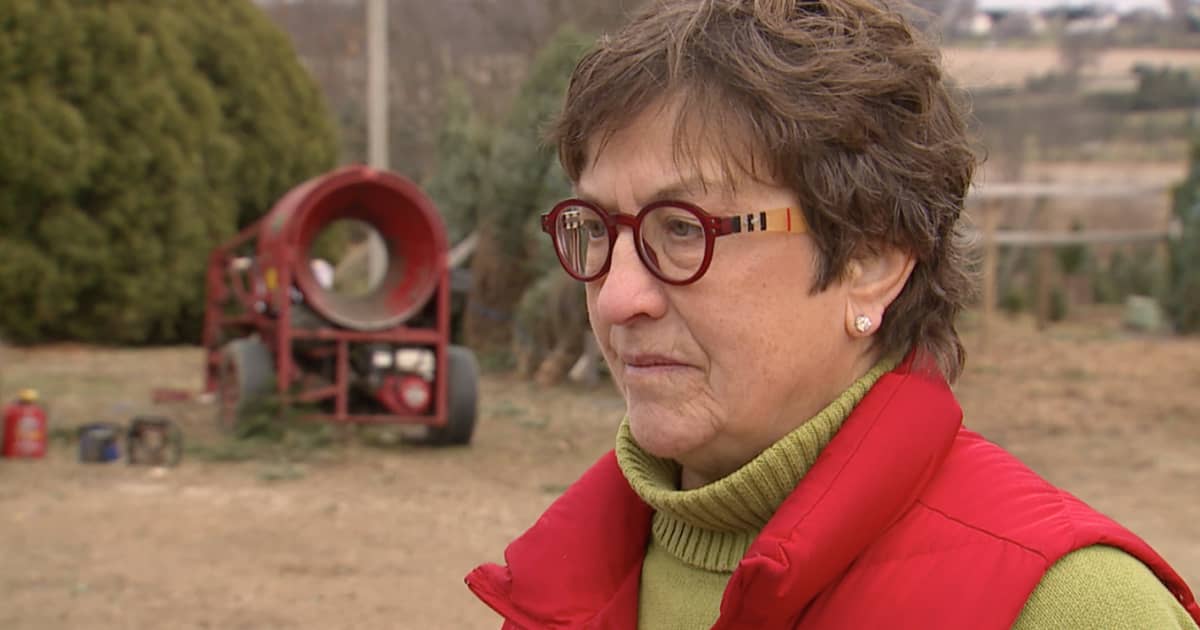“Bringing Mark home has been a top priority for President Biden and his national security team,” the official said. Haji Bashir Noorzai, a prominent member of the Taliban, who was in prison

How Afghanistan women’s football team made it to Australia
Playing football for your national team is a dream for many, but in Afghanistan, it could have been a death sentence for the players of the women’s side. Reserve goalkeeper Montaha explains her love of the game, why she had to burn her trophies and medals to escape following the Taliban takeover last August and why she loves Australia.
Don't Miss
WOOSTER, Ohio — For Rita Dush, Christmas trees hold many meanings. “Stewardship of the land, beauty, and happiness for families,”
CNN — Formula One world champion Lewis Hamilton has announced he will have a team competing in the inaugural all-electric
Queens, New York CNN — Coco Gauff, the world No. 10 women’s singles player, has defeated Belarusian Aryna Sabalenka 2-6

Nadia Nadim on women’s football in Afghanistan one year on from Taliban takeover
Nadia Nadim — the soccer player who fled Afghanistan when she was younger — speaks to CNN about the prospects for the women’s game in the country under Taliban rule one year on from their takeover of the country.
Don't Miss
How Afghanistan women’s football team made it to Australia Playing football for your national team is a dream for many,
CNN — Global pop sensation Blackpink have been chosen as Time magazine’s 2022 Entertainer of the Year, making the four-woman
Queens, New York CNN — Coco Gauff, the world No. 10 women’s singles player, has defeated Belarusian Aryna Sabalenka 2-6

Sydney
CNN
—
Australia’s men’s cricket team has withdrawn from a series of upcoming matches against Afghanistan in protest over the ruling Taliban’s restrictions on women and girls’ education and employment, Cricket Australia (CA) said in a statement Thursday.
The teams were scheduled to play three One Day International (ODI) games in the United Arab Emirates in March, but CA decided to cancel the series after “extensive consultation” with “several stakeholders including the Australian government,” the statement said.
“CA is committed to supporting [and] growing the game for women and men around the world, including in Afghanistan, and will continue to engage with the Afghanistan Cricket Board in anticipation of improved conditions for women and girls in the country,” it added.
In December, the Taliban announced the suspension of university education for all female students. The move followed a decision in March to bar girls from returning to secondary schools, coming after months-long closures that had been in place since the hardline Islamist group took over Afghanistan in August 2021.
Later that month, the Taliban ordered all local and international non-governmental organizations (NGOs) to stop their female employees from coming to work, warning that non-compliance would result in the revocation of their licenses.
The Afghanistan Cricket Board (ACB) responded to CA’s decision on Thursday, describing it as “pathetic” and “an attempt to enter the realm of politics and politicize the sport.”
“By prioritizing political interests over the principles of fair play and sportsmanship, Cricket Australia is undermining the integrity of the game and damaging the relationship between the two nations,” the statement added.
“The decision to withdraw from playing the upcoming ODI series against Afghanistan is unfair and unexpected and will have a negative impact on the development and growth of cricket in Afghanistan, as well as affect[ing] the love and passion of the Afghan nation for the game.”
The ACB said it was considering what action to take on the matter, including the possibility of writing to the International Cricket Council (ICC) and “rethinking the participation of Afghan players” in Australia’s domestic Twenty20 competition, the Big Bash League (BBL).
The ACB statement followed comments from prominent Afghan player Rashid Khan.
Khan, who played for the Adelaide Strikers in this year’s BBL, accompanied a statement on Twitter with the words: “Keep politics out of it.”
“I am really disappointed to hear that Australia have pulled out of the series to play us in March,” Khan wrote.
“I take great pride in representing my country and we have made great progress on the world stage. This decision from CA sets us back in that journey.
“If playing vs Afghanistan is so uncomfortable for Australia then I wouldn’t want to make anyone uncomfortable with my presence in the BBL. Therefore I will be strongly considering my future in that competition.”
CA had previously backed out of a proposed Test match against Afghanistan due to be hosted in Tasmania in November 2021 over the Taliban’s ban on women participating in sports.
“Driving the growth of women’s cricket globally is incredibly important to Cricket Australia. Our vision for cricket is that it is a sport for all, and we support the game unequivocally for women at every level,” CA said at the time.
Australia’s sports minister Anika Wells on Thursday said Canberra supports Cricket Australia’s move.
“The Australian government welcomes Cricket Australia’s decision to withdraw from the upcoming men’s One Day International series against Afghanistan, following the Taliban’s increased suppression of women and girls’ rights,” she tweeted.
Although the Taliban repeatedly claimed it would protect the rights of girls and women, the group has done the opposite, stripping away the hard-won freedoms for which women have fought tirelessly over the past two decades.
The United Nations and at least half a dozen major foreign aid groups have said they are temporarily suspending their operations in Afghanistan following the ban on female NGO employees.
Don't Miss
How Afghanistan women’s football team made it to Australia Playing football for your national team is a dream for many,
Nadia Nadim on women’s football in Afghanistan one year on from Taliban takeover Nadia Nadim — the soccer player who
Papua New Guinea (PNG) Foreign Minister Justin Tkatchenko said he was resigning as minister on Friday amid a controversy over
“Bringing Mark home has been a top priority for President Biden and his national security team,” the official said.
Haji Bashir Noorzai, a prominent member of the Taliban, who was in prison in the US on drug trafficking charges for 17 years, was granted clemency as part of the deal, the official said.
Frerichs, a Navy veteran from Illinois, was kidnapped in late January 2020 while he was doing construction contract work in Afghanistan. He was believed to be held by the Haqqani network, which is a faction of the Taliban. He was missing for less than a month before the US signed a peace deal with the Taliban.
Frerichs was able to walk on his own onto the aircraft, a source familiar with the matter said, and his physical and mental condition appear good. He is currently in Doha, Qatar.
Frerichs’ family praised Biden for securing his release, with his sister, Charlene Cakora, saying in a statement, “there were some folks arguing against the deal that brought Mark home, but President Biden did what was right. He saved the life of an innocent American veteran.”
“I am so happy to hear that my brother is safe and on his way home to us. Our family has prayed for this each day of the more than 31 months he has been a hostage,” Cakora said. “We never gave up hope that he would survive and come home safely to us.”
Earlier this year, The New Yorker published a video of Frerichs pleading for his release — the first time the Illinois native had been seen in years.
“I’ve been patiently waiting my release,” Frerichs says in the brief video, which he says is being recorded on November 28, 2021.
Months of negotiations
The Biden administration undertook months of negotiations with the Taliban to secure Frerichs’ freedom, a senior administration official said Monday, and the President decided in June to grant clemency to Noorzai if it would lead to the captive American’s release.
Speaking on a call with reporters, the official said it became clear that releasing Noorzai was “the key to securing Mark’s overdue freedom,” but the decision on clemency for the Afghan drug trafficker was a “difficult” one.
The administration does not see an equivalency between Noorzai, who was carrying out a 17-year sentence in the US, and Frerichs. Noorzai was not held at Guantanamo Bay, despite reports saying he was, the official said.
“We consulted with experts across the US government, who assessed that Noorzai’s (release) to Afghanistan would not materially change any risk to Americans emanating from the country or the nature of the drug trade there,” the official said.
“As we also said publicly at the time, we told the Taliban immediately after the strike, that we would hold them directly responsible if any harm were to come to Mark, and that the best way they might begin to rebuild trust with the United States, with the world, was to immediately release Mark,” the official said.
The official said the window of opportunity for the swap finally presented itself this month, and the administration “acted very quickly.” But they would not say where Frerichs had been held during his more than two years of captivity, nor would they say if the US had given the Taliban anything else for Frerichs’ release.
A second senior administration official said the US would continue to make clear to the Taliban that they must end hostage taking if they are to gain recognition by the international community.
Don't Miss
CNN — Before a ball was even hit at this year’s US Open, many would have predicted three of the
How Afghanistan women’s football team made it to Australia Playing football for your national team is a dream for many,
CNN — Jimmy Lippert Thyden says he always knew he was adopted. He also knew that he had been born
Afghanistan

Afghanistan
Don't Miss
How Afghanistan women’s football team made it to Australia Playing football for your national team is a dream for many,
Nadia Nadim on women’s football in Afghanistan one year on from Taliban takeover Nadia Nadim — the soccer player who
Sydney CNN — Australia’s men’s cricket team has withdrawn from a series of upcoming matches against Afghanistan in protest over
















